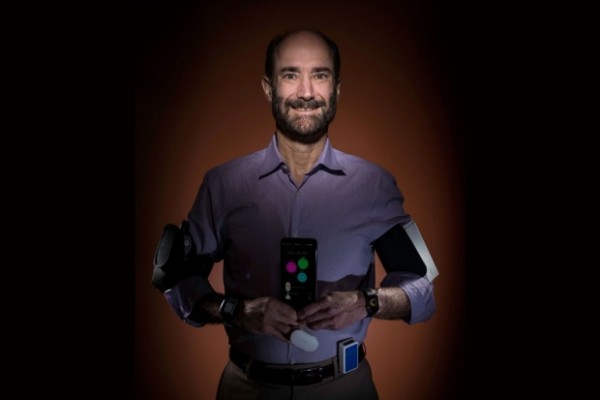By Ana Verayo, | January 16, 2017

Geneticist Michael Snyder was one of the participants and the lead author of the study. (Steve Fisch/Stanford Medicine)
In the near future, wearable sensors could play a vital role in our health as researchers are developing body sensors that can detect symptoms when a person is about to get sick.
In a new study, researchers from Stanford University's School of Medicine say that wearables can track heart rates, skin temperatures and activities including metrics to detect if the body is inflamed or going through initial stages of an infection.
Like Us on Facebook
During the study, researchers were able to obtain almost two billion measurements from 60 participants who wore a suite of biosensors. Biological data was collected periodically from their blood tests, genetic imprints, and other measurements.
The researchers were able to determine a baseline for normal measurements for each participant and then monitor any changes from those norms using data from their wearables.
The lead author of the study, geneticist Michael Snyder of Stanford was also one of the participants of this study. The results showed that there were deviations in his heart rate and oxygen levels, leading to abnormal biological measurements.
Snyder was wearing a suite of wearables during a long international flight and shortly had a fever and symptoms of another sickness known as Lyme disease, which he contracted from ticks in New England carrying that bacteria.
These wearables cannot only monitor overall health but also early symptoms of conditions like infections, autoimmune diseases, and even developing cardiovascular diseases as well as diabetes and cancer.
This unique biosensory system is still under development, and further research is required to refine body measurements. However, this could play a crucial role in monitoring the initial stages of a disease.
This new study was published in the journal PLOS Biology.
-
Use of Coronavirus Pandemic Drones Raises Privacy Concerns: Drones Spread Fear, Local Officials Say

-
Coronavirus Hampers The Delivery Of Lockheed Martin F-35 Stealth Fighters For 2020

-
Instagram Speeds Up Plans to Add Account Memorialization Feature Due to COVID-19 Deaths

-
NASA: Perseverance Plans to Bring 'Mars Rock' to Earth in 2031

-
600 Dead And 3,000 In The Hospital as Iranians Believed Drinking High-Concentrations of Alcohol Can Cure The Coronavirus

-
600 Dead And 3,000 In The Hospital as Iranians Believed Drinking High-Concentrations of Alcohol Can Cure The Coronavirus

-
COVID-19: Doctors, Nurses Use Virtual Reality to Learn New Skills in Treating Coronavirus Patients







